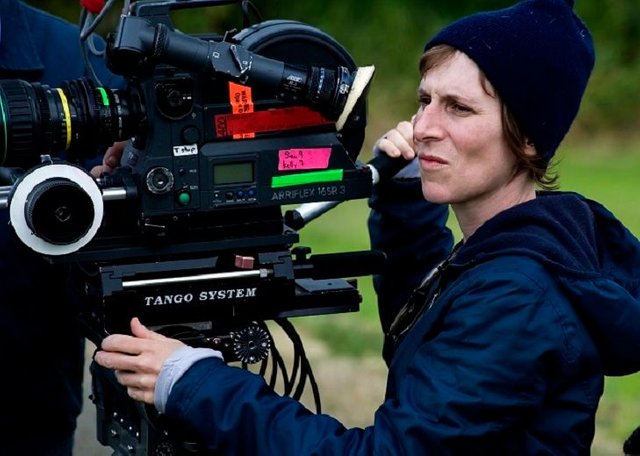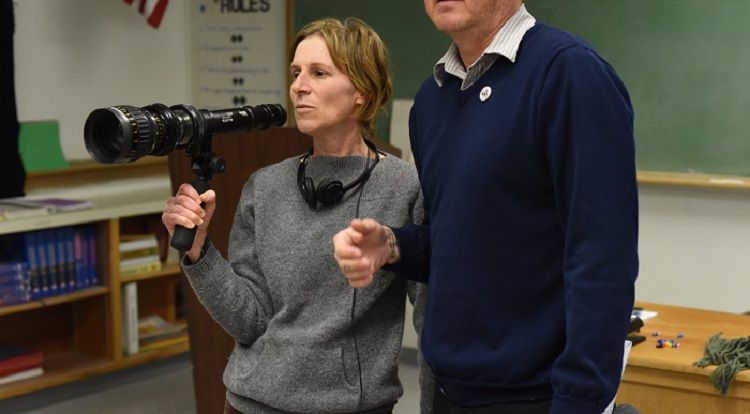The movies of the female director Kelly Reichardt
"Wendy and Lucy," the first Kelly Reichardt movie I watched started out as a nice American indie - marginal character, close - ups, weekly stuff, natural sound, unobtrusive play, sharp fit, calm motion of the camera... Five minutes after the start, during the first sinister night scene, I vaguely felt something extremely rare, which seemed to me only when reading two or three favorite writers - suddenly the mysterious feeling that everything was not told. That somewhere there, below, there is a world I know nothing about, a whole other planet, a lot of foreign planets that are invisible and they can only hint. This sensation remained to the end and appeared in every subsequent viewing of her film. If the basic rule of creative writing is "do not say but show," Kelly Reichardt does not even show, but suggest. In a terrible scene, I do not just see that the character is afraid, and I'm afraid of it too. Something like the effect of surrealism, but only achieved with realistic and minimal means. Verbal frugalness and conscious retention on the surface, characteristic of minimalist literature, are also found in Kelly Reichardt's films. Where there are no adjectives and adverbs in the minimalist stories, Reichardt does not have any effects or showcases. The narrative moves on the barely reaching peaks of enormous icebergs - the inner life of the characters is far richer than the outside, but unlike the outer one, it can not be seen (no glamor in these films), but only to feel. Hence the feeling that Kelly Reichardt allows her characters to be more than she knows about them, and builds their stories, as she says in an interview, from "multiple small revelations," but they do not reveal everything, they do not claim sovereignty above the truth, never put a point. The meaning is not stated, but it is carefully constructed from the composition of the scenes, from the context, always with the active participation of me, the viewer.
With this interest in the hidden inside, no wonder that Kelly Reichardt and Jonathan Raymond (the screenwriter of all of her films, except her first one - "River of Grass") urgently put her characters into a lost state, always somewhere in the unknown and overpopable moment between point A and point B, when they have the least public stench, their inner world is as messy as possible and they become alien themselves. Kurt and Mark from "Old Joy" are lost on the road to the mineral springs; Stephen Mike's caravan from Meek's Cutoff wanders in the unknown between the abandoned home and the new settlement; Wendy of "Wendy and Lucy" is locked up in a provincial town in Oregon (always Oregon, with its raw nature, used as a beautifully scenery decor) on her way to her ideal Alaska, and on top of that she loses his dog Lucy. It seems as if they are lost, these people are the most real ones. The journey itself, movement, is much more important than the distant departure and the unclear arrival, which are most often not shown in the movie. Forcing is more than a random coincidence - it is a logical consequence of character characters. These are usually temeruts, whose main motivation is emancipation from the diseases of modern society through escape to the natural. Kurt and Mark dug into the mineral springs deep in the woods, supposed to seek their lost friendship, and actually to counteract a lack; Wendy drives up to Alaska with almost no accessories and money; Josh from" Night Moves" lives on a farm that tries to self-support.
Accordingly, there is a lot of silence in these films - one of the things that cinema is capable of exploiting a bit more effectively than literature. But there is something else. Raymond's and Rajthart's lonesters, wherever they go, no matter how silent they are, they are never alone. Interaction and conversation with the modern society, from which they are strangled, is invariably imposed upon them. Wendy faces the need for a mechanic, a telephone, a supermarket, a toilet, a xerox; Josh and his friends face a number of human problems as they acquire the ingredients for their bomb, and finally, after the crime, he falls, not in the woods, but in a shop. And these interactions are always baked - from the most banal word exchange between Wendy and the mechanics to Josh's effort not to pass before a hired policeman that he just blew the dam right now - there is always tension, ambiguity, horror. What's more interesting, however, is the special attention paid to passing characters, with whom the main characters also often communicate, albeit too indirectly. The detouring of the camera at any time to trace a wheelchair man's pace, the faces of the wanderers, or just a random stranger, does not add anything to the storyline but serves the interest in the mysterious world. Just these insignificant insertions bother me that people whose life routes intersect with that of the protagonist are not just pebbles on the road, but unfamiliar planets wandering in their own orbits.


Amazing post! Keep up the good work!
Thanks :)
You got a 7.59% upvote from @postpromoter courtesy of @godflesh!
Want to promote your posts too? Check out the Steem Bot Tracker website for more info. If you would like to support the development of @postpromoter and the bot tracker please vote for @yabapmatt for witness!
Really Great Post! Cheers!
Really nice well written analysis. It's great to see talented female directors getting more credit.